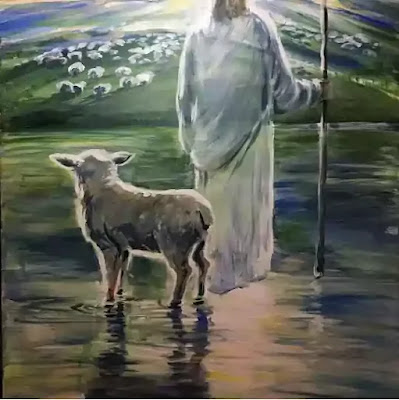Also Read
The Shepherd
Summary and Analysis
Introduction:
In the first line of the poem, 'The Shepherd' begins with a capital letter. Rather more than the lovely scenery of a landscape with a few sheep and a shepherd, it has a deeper symbolic meaning. The Shepherd stands for God or Christ and the sheep represent human beings. Human beings are happy under the protection or blessings of God.
 |
| The Shepherd |
Summary :
The Shepherd enjoys an enviable lot because he roams from morning to evening all along the valleys. Besides, his tongue is employed in singing songs in praise of God. He feels happy and peaceful at mind as he is always among his sheep who let out innocent calls. He guards them while they are grazing peacefully. The flock of sheep sense the proximity of the shepherd and feel safe and sound.
Religious Significance :
Something which is noteworthy in the poem lies in the third and the fourth lines. All the other lines are in present tenses whereas the third and fourth are in future tense. This may hint at the fact that the Shepherd, as he does in the present world. 'shall' follow his flock and sing hallelujahs in the other world also. More than referring to Christ 'The Shepherd' may also refer to man whose charity and broad heartedness is the core and kernel of all religions, as well as that of Christianity. Thus we see that Blake is more practical than theoretical with regard to his dogma or maxim of religion.
Spiritual Strength of the Shepherd:
The picture given by the Blake in 'The Shepherd' is that of mutual concord and kindness. The calls and the answering calls of the lambs and ewe in security under the watchful glance of the Shepherd reinforces the spiritual significance of the situation. And it is in this spiritual atmosphere of harmony and affection that the Shepherd's tongue overwhelms with the songs in praise of God. May be the Shepherd is addressing formal prayers to God. Though this is not emphasised it is clearly implied that whatever he does is an assertion of his ready acceptance of his lot. He feels comfort and cheer in the spiritual atmosphere which strengthens him both morally and spiritually.
The Shepherd as a Passive Agent of Harmony : The Shepherd's role in the poem is never an active one. He plays the role of a guardian angel. His presence is not to guide, nor to put a curb on his flock: instead it is meant only to ensure their security. And this security is felt by the flock that graze peacefully. The Shepherd is never to impose his will but he is there with an innocent kind of friendship which involves taking care of his allies as well as providing them all the freedom and liberty to move and act as they like.
Conclusion :
The poem abounds in idyllic and pictorial beauty. It is a rural portrayal of a flock of sheep followed by a musing Shepherd. The thin bleats of the sheep and the green valleys where they have flocked together are the most agreeable testimonies of the poet's flight of imagination. There is an ease and pleasant carelessness pervading everywhere. The poem contains another aspect of innocence represented by the sheep and the shepherd and their world is one of mutual relationships among men, animals and Almighty God.